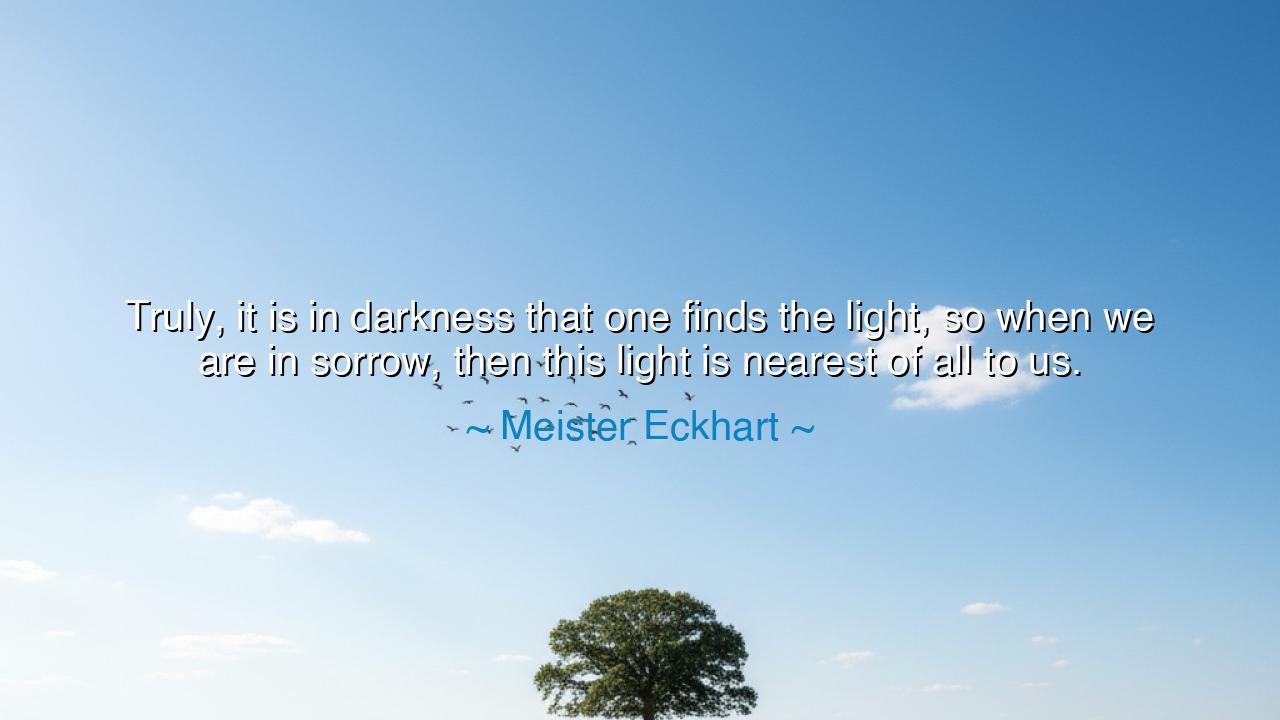
Truly, it is in darkness that one finds the light, so when we
Truly, it is in darkness that one finds the light, so when we are in sorrow, then this light is nearest of all to us.






“Truly, it is in darkness that one finds the light, so when we are in sorrow, then this light is nearest of all to us.” Thus spoke Meister Eckhart, the mystic of the Middle Ages, whose words burned like lanterns in the corridors of the soul. In this saying lies a paradox both mysterious and liberating: that in our hours of greatest darkness, when sorrow presses us to the ground and hope seems extinguished, the hidden flame of light burns nearest. For the soul that suffers is stripped of illusions, and in its nakedness, it becomes most ready to encounter the divine.
The origin of this wisdom is rooted in the mystic’s vision of God. Eckhart taught that the Eternal does not shine only in triumph, but in brokenness; not only in joy, but in sorrow. For when all worldly supports fall away, when pride is humbled and strength exhausted, then the heart becomes still enough to perceive what it could not see before. Darkness is not the absence of light but its birthplace. Just as the seed must be buried in the soil before it rises, so too the soul must descend into sorrow before it beholds its truest strength.
History testifies to this mystery. Consider the life of Nelson Mandela. For twenty-seven years he sat in the darkness of a prison cell, cut off from family, from freedom, from the world. To many, such years would crush the spirit. Yet it was in that darkness that Mandela found his light—the light of patience, of forgiveness, of inner strength. When he emerged, he was not consumed by bitterness, but filled with a radiance that would heal a divided nation. His story is proof of Eckhart’s words: the deeper the sorrow, the nearer the light.
The ancients, too, bore witness to this truth. In Greek tragedy, heroes often found their clarity not in prosperity but in ruin. Oedipus, blinded and broken, saw at last the truth he had been blind to all along. The darkness of suffering stripped him of falsehood, leaving only the clarity of vision. Likewise, in the Psalms, it is in the valley of the shadow that the psalmist discovers the Shepherd’s guiding rod. Thus, across ages and traditions, we are told: sorrow is not the enemy of light, but its herald.
From this teaching arises a lesson for our own lives. When grief or despair overwhelms us, we are tempted to believe we are abandoned. Yet Eckhart’s wisdom bids us see otherwise: that it is precisely then that the hidden flame is closest. The anguish you carry may be the doorway to a new strength, a new vision, a new depth of compassion. Do not flee from the sorrow—sit with it, honor it, and seek within it the faint glimmer that can guide you forward. The light is nearest when the night is darkest.
Practical steps follow from this truth. When sorrow strikes, resist the urge to numb yourself or flee into distractions. Instead, breathe deeply into the pain and ask: What is this darkness teaching me? What light might it hold? Write, reflect, pray, or walk in silence until the whisper of insight appears. And when others walk in darkness, do not rush to banish it with hollow cheer. Sit beside them, as a lantern in their night, until together you glimpse the hidden light.
Therefore, let Eckhart’s words be written upon your heart: “It is in darkness that one finds the light.” Carry them as a shield in sorrow, and as a lamp for those who suffer. For the soul that has passed through darkness and found the light within becomes unshakable, radiant, and free. And such a soul becomes, in turn, a light for the world.






AAdministratorAdministrator
Welcome, honored guests. Please leave a comment, we will respond soon